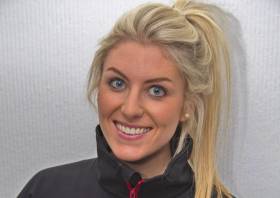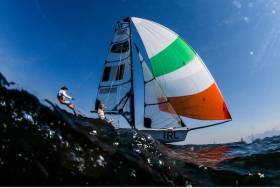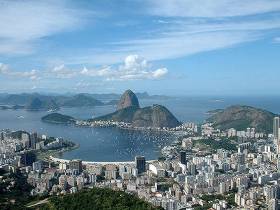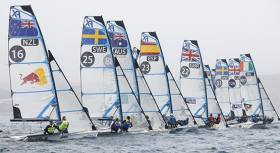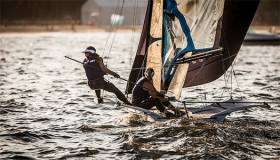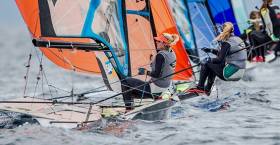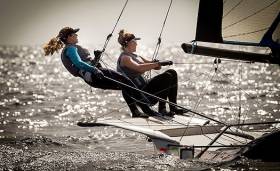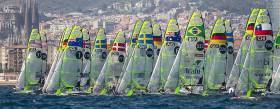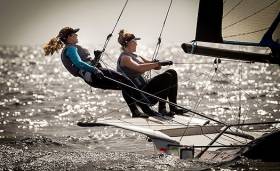Displaying items by tag: Andrea Brewster
Saskia Tidey Wants To Race For Great Britain At Tokyo 2020
#SaskiaTidey - Saskia Tidey has begun training with Team GBR with a view to representing Great Britain at the 2020 Olympics in Tokyo, as The Irish Times reports.
The move comes after the retirement of Tidey’s 49erFX skiff partner Andrea Brewster following last summer’s Rio games, where they finished 12th in the debut Olympic event for their class.
Tidey, who qualifies for British citizenship through her father, indicated that Ireland’s concentration on the Laser Radial and 420 classes prompted her to make the change.
“There wasn’t an option here in Ireland in the 49er FX with another girl who had the experience to sail at the same level … to be competitive and win a medal in 2020,” said Tidey, who is already training with her new partner, Rio top-10-placed Charlotte Dobson.
However, changing national representation in competition may not be smooth sailing for 23-year-old Tidey.
World Sailing rules dictate that three years must pass before sailing for one country and competing under another’s flag.
That means the soonest Tidey could compete for Britain at a world championship is 2019, unless the World Sailing Board makes an exemption in agreement with the relevant Member National Authorities.
Brazil Clinches 49erFX Gold by Just Two Seconds, Ireland 12th Overall At First Olympics
The Olympic Sailing Competition rose to a dramatic crescendo, with the home nation winning a gold medal in the Women's Skiff by the most ridiculously small margin, just two seconds. Silver would have been great, but gold for Brazil has set off a party that will last for days. Ireland's Andrea Brewster and Saskia Tidey finished 12th overall from 20 at their first Olympics.
After no wind the previous afternoon, the final day delivered perfect 14-knot breezes for the finale. The four Medal Races kept the crowds on Flamengo Beach entertained all afternoon. It started with an ever-shifting battle for silver and bronze in the
Women's Skiff – 49erFX
The crowd on Flamengo Beach went wild as Martine Grael and Kahena Kunze (BRA) won gold by just two seconds from Alex Maloney and Molly Meech (NZL) in a nailbiting final run to the finish. New Zealand took silver and bronze went to Denmark's Jena Hansen and Katja Salskov-Iversen. The team to miss out on a medal from the four-way battle was the Spanish crew of Tamara Echegoyen and Berta Betanzos.
With the wind blowing 12 to 15 knots, New Zealand launched off the left-hand end of the start line, Brazil got away cleanly from the middle while Denmark and Spain made messy starts on the right. Maloney and Meech got into a good lead on the first lap but led Brazil by just 13 seconds at the halfway stage of the three-lap race. At the bottom gate, the Kiwis chose the right-hand side and Brazil broke off to the left in search of something different. When they came back together again at the top of the course, Brazil's alternative tactics had given them a ten-second lead.
Down the run to the finish the Kiwis attacked hard and made up ground on the Brazilians, but somehow Grael and Kunze held on to get across the line just two seconds ahead.
After five-time Olympic medallist Robert Scheidt just missed out on a sixth medal in the Laser, finishing an agonising fourth, it was critical that the Brazilian 49erFX team came away with something from the final race of Rio 2016. To come away with gold has sent their home nation into ecstasy. When Grael and Kunze won gold at the Olympic Test Event a year ago, the Brazilian media went wild. But one can only imagine how big this will go now that they have become Olympic Champions.
Grael's victory continues a great family tradition, her father Torben having won five Olympic medals for Brazil. Torben was watching from a coach boat and was one of the first to congratulate his daughter. Martine said, "To receive the medals here in Rio with all our friends and family is indescribable. But I didn't think about the fact the Brazilian sailing team had no medals. I was just focused on the race, nothing else.”
Kunze said, "Before starting the Medal Race we hugged each other and said, 'Let's give our best and no matter what the result it's going to be fine.' We were already happy to be among the first four teams, that was already an excellent result. And it's incredible to compete at home with these amazing fans. We hope to influence more girls to compete in sailing and to make our sport grow.”
Maloney and Meech so nearly made it a Kiwi double in the Skiff classes after Pete Burling and Blair Tuke had won gold in the Men's 49er. But any disappointment at missing 49erFX gold was swiftly cast aside as the Kiwi girls celebrated taking the silver. "It's an amazing evening for the Brazilian girls,” said Maloney. "I think the next couple of weeks will be pretty special for them.
With her brother Sam winning bronze two days earlier in the Laser Men's division, it's a double celebration for the Meech family. "I've really enjoyed it and it's been an amazing week,” said Molly. "We've sailed really well and were really happy with the way things have gone this week. The Olympics has been an amazing experience. It's awesome to have all the support back home and everyone getting up early to watch us race, it's really cool. The whole of the New Zealand sailing team has been working really hard for the last four years and I think that it's all paid off for everyone. It's amazing to be part of the team.”
Hansen and Salskov-Iversen beat the Spanish in the battle for bronze. The 49erFX was expected to deliver some of the most exciting and unpredictable racing at Rio 2016, but no one could have imagined that the gold would come down to the last two seconds.
Ireland's Sailing Olympians Deserve Serenity In Their Cocoon
Ireland’s six sailing Olympians have reached their selections for the 2016 Games at different times. Some have been secure with their places for many months, while others have been confirmed more recently, with the final place being filled on May 18th. Now, if all goes according to plan, for the next six days they’ll be at some remove from the petty hassles of everyday life, safe in a cocoon of mental and physical security as the clock ticks steadily on towards their appointment with destiny. The official opening of the 2016 Games is in Rio de Janeiro next Friday (August 5th). Then for the ISA squad, it’s into practice races and the start of the Sailing Olympiad on Monday August 8th. W M Nixon takes an overview.
The Olympic Games are very important for Irish sailing. Some would say disproportionately so, while a few contrarians might even argue that, as a vehicle and equipment sport as much as a physical pursuit, sailing is questionably Olympian in the first place, and certainly not mainstream.
Perhaps. But for a specialist sport like sailing, the Olympics provide a unique four year opportunity to be in the national and international limelight. Over the years, we’ve learned that an Olympic Medal – or even the prospect of one - is a matter for general interest and celebration regardless of how the sport in question is perceived by the general public at home.
Like it or not, the Olympics simplify it all. And the value of winning a medal, even the most modest one, is almost beyond quantification. But at the very least, if at the Olympics you put in an honourable performance, clearly give of your very best, do your uttermost as part of a warm human story, then your sport’s feelgood factor rises to provide new levels of interest and tangible support at official level.
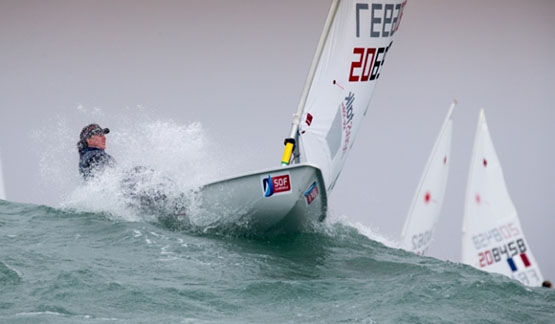 The Olympics may reduce sailing to its basics, but when a medal seems a possibility – as for Annalise Murphy in 2012 – suddenly our specialist sport comes centre stage at national level
The Olympics may reduce sailing to its basics, but when a medal seems a possibility – as for Annalise Murphy in 2012 – suddenly our specialist sport comes centre stage at national level
But how can Olympic sailing project itself as something of particular human interest? It’s simple. People want a people story, and while sailors will happily discuss the minutiae of boat design, sail shape and equipment structure for hours on end, Joe and Josephine Public think a boat is just a thing, and an odd, often wet, and uncomfortable thing at that. They want a human story with which they can identify, and if they don’t get that human story - and quickly – their interest will immediately move elsewhere, for there’s any amount of ready distraction in today’s world.
Time was when the Olympics were about catering for the needs of the athletes, but now the demands of an instant global audience dictate everything. And time also was when the sailing Olympics had at least as many keelboat classes as it had dinghies, and the venue was selected at locations sometimes hundreds of miles from the hosting city in order to provide “ideal” sailing conditions.
But in this age of cities, the demands of the glamour city dominate, and if the host city happens to be picturesquely beside the sea, then that’s where your sailing will be, regardless of the effect of a steep coastline and high buildings on the winds of the race area.
As for keelboats in the sailing Olympics, forget it. Ballast keels reduce the need for athletic capability. And forget individuality and a sense of ownership in boats. Today’s Olympic sailing ideal is exemplified by the Laser, with anonymous newly-manufactured utterly standard boats, sails and masts allocated only days before the event, thereby making the athleticism and ability of the sailors the paramount factor, rather than having any technological edge in boat and equipment.
This paring-back of our beloved sport means that the inevitably ageist structure of the modern Olympic sailing team is not at all representative of the true overall picture of modern world sailing, with its themes of a Sport for Life, and Love Your Boat. With our global spread of 143 different boat classes entitled to hold a world championship, sailing is something of a mystery for the rest of the world. Yet it’s only with the artificially-imposed simplicities of Olympic sailing that we get a chance to explain what it might be about.
Or more accurately, we get a chance to see how the general run of journalists respond to sailing. For it’s only with the very big things of popular interest like the Olympics and maybe the America’s Cup, and perhaps disaster stories like the Fastnet Race of 1979, that your solitary sailing journo gets to rub shoulders with other journalists. So when the ISA staged a Press & Radio Conference this week for the media to meet and question the 2016 Olympic Sailing squad, we went along not to ask questions ourselves, but rather to hear what sort of questions these inquiring representatives of the outside world would ask about sailing.
It’s ironic, but once upon a time it was thought that yachting reports should really appear in the social and gossip pages rather than in the sports pages. Yet today, thanks to its involvement in the Olympics with that nationally-electrifying almost-Medal of 2012 and the ever-increasing emphasis on human stories, sailing is now accepted in Ireland as a proper sport.
 Once upon a time, it was thought that sailing was best reported in the social and gossip pages...
Once upon a time, it was thought that sailing was best reported in the social and gossip pages...
But the reality beyond that is that all sports, sailing included, are now being reported with the emphasis on the human angle rather than on the athletic and technical issues, though of course good old-fashioned winning is still paramount. But as for how that win is achieved – well, open any sports section of a print newspaper (remember them?) and most of the photos will be of people, frequently in facial close-up and showing extreme reaction to some incident or achievement which is of itself so incidental that it is seldom illustrated.
Thus we’re getting to the stage that serious newspapers are veering away from carrying anything like old-fashioned social diaries. Today any event – whether it be a sports championship, company annual general meeting, or a major political announcement – is reported as though it belongs in the social diary, becoming just another happening in the daily progress through the world of the nation’s social life.
So although Tuesday’s press conference made token gestures of getting to grips with how our youngest Olympic sailor Finn Lynch seems to do all his main training in Croatia, and whether or not Annalise Murphy has been made ill by the fact that she has put in significant time during the past three years training in the polluted waters of Rio de Janeiro (she hasn’t), really what the press corps wanted was human stories based on past events to which their readers could relate, and happily for Irish Olympic sailing, our team could come up with the goods.
Thus next morning’s papers came up with a story in the general news pages about how Saskia Tidey continues to draw inspiration from her 81-year-old kidnap-surviving dad Don, while another paper had the sports pages telling of how Annalise Murphy came within a whisker of winning the Bronze in 2012, but then came to terms with it, put it behind her, and went into the dedicated count-down towards Rio 2016.
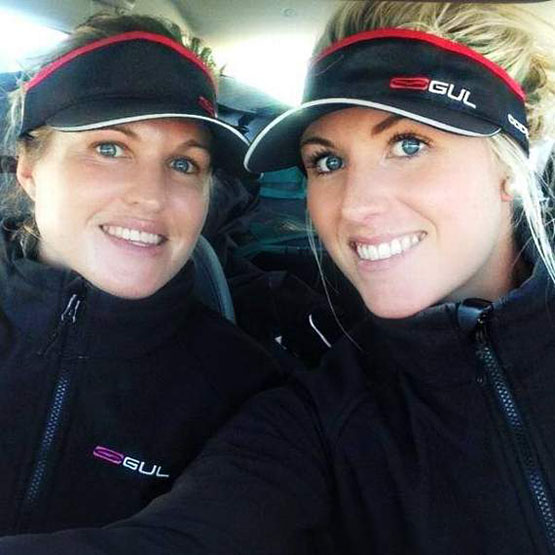 Andrea Brewster and Saskia Tidey, 49erFX Olympic crewAs for the 49er guys from the north, Ryan Seaton & Matt McGovern, they provided oodles of copy about just how they’ve managed to stay together for so long to such an extent that you could see a spectral “The Odd Couple” sign hovering over them during their part of the show.
Andrea Brewster and Saskia Tidey, 49erFX Olympic crewAs for the 49er guys from the north, Ryan Seaton & Matt McGovern, they provided oodles of copy about just how they’ve managed to stay together for so long to such an extent that you could see a spectral “The Odd Couple” sign hovering over them during their part of the show.
And then to give everyone a warm community feeling, we’d the real page-turner of how Finn Lynch of Bennekerry in County Carlow comes to be the youngest sailor in Ireland’s Olympic squad. As the details of that were teased out, we may have learned more about the GAA in Bennekerry and the little sailing club in Blessington than we did about the Laser in Rio. But if the purpose of Tuesday’s gathering was to give Irish Olympic sailing a friendly and responsive human face, then Finn Lynch and his team mates have won gold in the social stakes already.
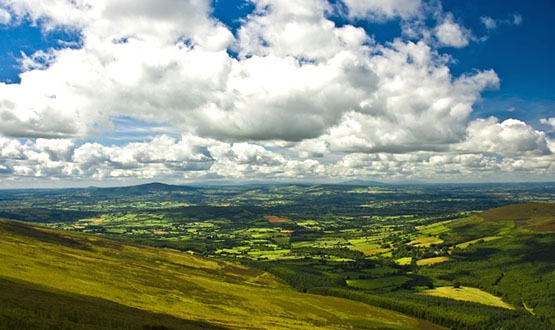 Profoundly rural – Finn Lynch’s home county of Carlow
Profoundly rural – Finn Lynch’s home county of Carlow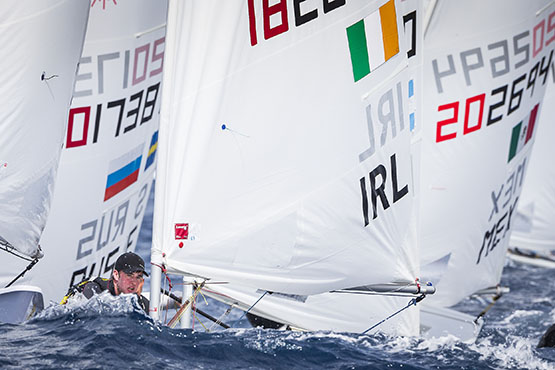 The Young Man and The Sea – Finn Lynch takes the Olympic Laser place in Mexico on May 18th
The Young Man and The Sea – Finn Lynch takes the Olympic Laser place in Mexico on May 18th
Their boats? At the conference, boats were very quickly shunted aside in the pursuit of human stories. Boats are trouble enough to comprehend, sailing boats are double trouble. The problem with sailing boats is sails. Mysterious sails harnessing the invisible wind can make the straightforward fact of Olympic participation into something very weird.
With rowing, by contrast, you may have boats, yet it’s so obviously sheer athletic prowess which brings rowing success. But sailing? For sure, athletic ability, training and coaching are more important than ever. But sails and the wind remain firmly in the region of the sacred mysteries. Thus far from trying to group sailing together with rowing and swimming as water-based sports, it’s arguable that the only Olympic area which shares a unique complexity with sailing is equestrianism, for a sailing boat can seem as much of a living thing as a horse.
So how are our sailors of the sea horses going to do in Rio? As Annalise Murphy has more experience of the venue than anyone else, her opinions were of special interest. She crisply dismissed any grumblings about the flukiness of the sailing waters by saying that the unpredictability is so general in sailing in Rio’s winter (or what passes for winter when you’re near enough to the equator) that in the end it’s the same for everyone.
Certainly she’s giving it her best shot, and she has benefitted – as have all the Irish sailing squad - from the involvement (intensive in her case) of uber-coach Gary Keegan of the Institute of Sport. He’s leaving the Institute for a new venture after the Olympics, but for now, he has helped guide Murphy to peak form, thanks to a closely-controlled weight reduction programme as part of a carefully-monitored training plan which, at Tuesday’s conference, had the Irish sailor looking extremely fit and well, with her mental outlook in a very good place.
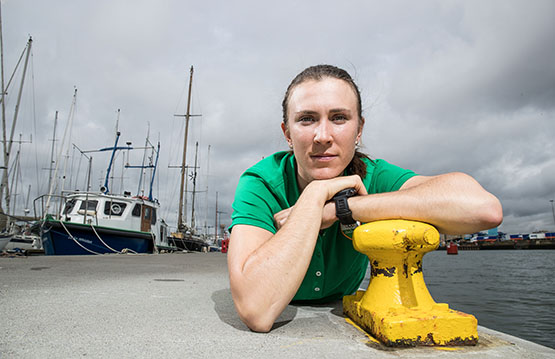 Annalise Murphy in thoughtful mood on Tuesday. Photo: Dan Sheridan/INPHO
Annalise Murphy in thoughtful mood on Tuesday. Photo: Dan Sheridan/INPHO
Inevitably the new-look Murphy has to be the most likely medal prospect, for despite her significant height, she’s certainly rated as a contender by her peers. Of the rest of the team, the two 49er guys have shown they can do it, they won the gold in Palma in April but have been erratic since, yet with the selected nature of the Olympic fleets, they could well be on the money.
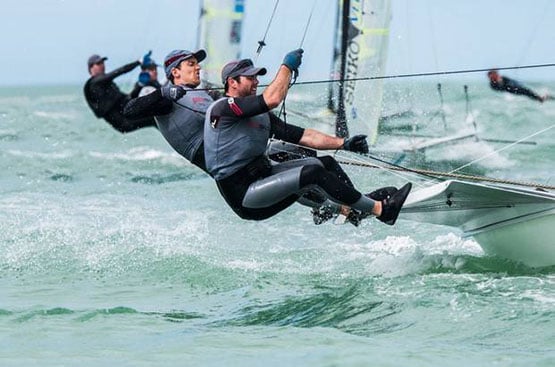 Ryan Seaton and Matt McGovern keeping busy
Ryan Seaton and Matt McGovern keeping busy
Andrea Brewster and Saskia Tidey on the women’s skiff made it into the Olympic qualification by the skin of their teeth, but if a sporting outlook and gallant determination are keys to success, then their showing will have an added interest.
While the rest of the team have been on the scene for a while, Finn Lynch is the new kid on the block. But despite only turning twenty back in April and then not getting his Olympic qualification until May, he has been maturing before our very eyes ever since he started this particular journey a year ago.
The Finn Lynch story just builds and builds, for not only is he the youngest member of the Irish sailing team by far, but he is competing in the most numerous class as the Lasers will be mustering 46 boats at Rio. And he will find himself racing in the distinguished company of one of the most popular sailors in the world, Brazil’s legendary Robert Scheidt, who at 43 will be the oldest competitor in the Sailing Olympics 2016.
There are great stories already there. And there could be some mighty stories in the making. As ISA Performance Director James O’Callaghan put it, it may be very much an outside shot, but we might even be due a medal. Either way, our dedicated Olympic squad – sailors and coaches alike – have brought sailing centre stage in the Irish consciousness for the next three weeks. But for now, they’re very deservedly in seclusion even if, in the outside world, the rumour mills will inevitably grind on.
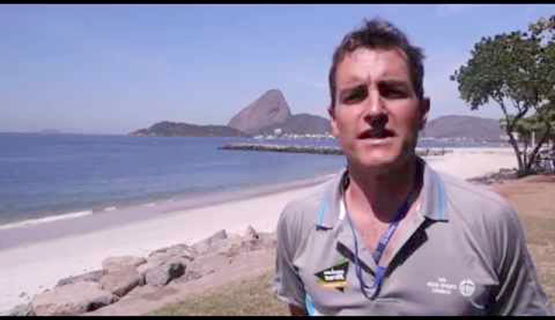 ISA Performance Director James O’Callaghan in Rio de Janeiro
ISA Performance Director James O’Callaghan in Rio de Janeiro
Ireland's Olympic Sailing Team will be hoping that the prospect of slightly more wind for the second day of racing tomorrow might boost some poor opening results scored today at the Sailing world Cup in Weymouth. There is still plenty of racing to try to catch up over the next three days and tomorrow Friday will be used to continue the catch up on Wednesday's missed races. Ireland's best result was in the mens 49er skiff where Ryan Seaton and Matt McGovern are mid fleet.
All of the ten Olympic fleets took to the water to tackle a bumper day of racing. Wednesday's little to no breeze and bright sunshine was replaced with strong easterly winds and fog on Thursday morning. As the day progressed, the breeze dipped and the fog disappeared as a full schedule of 34 races spread across all ten Olympic fleets concluded.
For all but the Men's RS:X, it was the start of the competition after Wednesday's frustration and the serious Rio 2016 Olympic contenders took to the front of the packs.
For the Irish Olympic team bound for Rio, Annalise Murphy of the National YC is well capable of improving on her 37 from 39. She is a place behind Rio trialist Aoife Hopkins of Howth in 36th. After three Radial races, the top three nationalities replicate the positions of the flags at London 2012, China, the Netherlands, then Belgium. The familiar faces of Lijia Xu (CHN) and Marit Bouwmeester (NED) remain but Emma Plasschaert is leading the charge for Belgium with the London 2012 bronze medallist, Evi Van Acker, 15th after a black flag in the opening race. Each sailor took a race win and Xu leads on three points. Bouwmeester follows on four and Plasschaert on seven.
Ryan Seaton and Matt McGovern are 16 from 30 but they will rue the black flag disqualification in race 2. The 49er fleet touched back ashore at 18:20 after four light and tricky races. New Zealand's Logan Dunning Beck and Jack Simpson continue to fly the flag for the nations 49er sailing, leading the 30-boat fleet on 12 points. Spain's Diego Botin and Iago Lopez and Great Britain's Dylan Fletcher and Alain Sign follow behind the Kiwis.
In the womens 49erfx, Andrea Brewster and Saskia Tidey of the Royal Irish YC are 14 from 15. Sailing World Cup Hyères winners Lisa Ericson and Hanna Klinga didn't immediately pick up from where they left off just a few short weeks ago as they were OCS in the opening race. However, they quickly found the form that helped them win in Hyères, following up with a third and double bullets to lead the fleet.
"It's the beginning of the regatta so anything could have happened today,” explained Klinga. "Apart from the OCS, we are happy but we will take less chances now because we can't afford to get another bad result, but we will think exactly the same as normal, just race and look forward.”
The Swedes have moved into serious contenders for an Olympic medal and have got their spot at Rio all sewn up. They were involved in a long running battle for national qualification, facing up against Julia Gross and Cecilia Jonsson, one in which Ericson and Klinga triumphed. However Gross and Jonsson are still keeping their rivals on their toes and sit one point behind them on the leader board.
Charlotte Dobson and Sophie Ainsworth (GBR) follow, two points off the leaders with Norwegian twin sisters Ragna and Maia Agerup occupying fourth overall.
The Agerup sisters will be heading to Rio 2016 and are using Weymouth and Portland to sharpen up, "We wanted to have some racing before the Olympics so that's why we decided to come here. We only got selected a few days ago by the Olympic Committee so it's been pretty full on. We have been training in Rio the past couple of weeks and we will go out again soon.
"We take this regatta as good training and we will push it and see how far we can go
Full results are here
Irish Olympic Sailors in Action in Weymouth
All six of Ireland's Olympic sailing team bar one are in action at the final World Cup sailing competition ahead of Rio 2016 gets underway this week in Weymouth this week.
Ireland’s Olympic veterans from four years ago will be first into action on Wednesday morning. The venue is the notoriously windy London 2012 Olympic site though the sailors are preparing for completely different conditions expected in Brazil.
Annalise Murphy in the women’s single-handed Laser Radial event will face all three medallists from her event in 2012 when she narrowly missed a place on the podium. China’s Lijia Xu (Gold) along with The Netherlands’ Marit Bouwmeester (Silver) and Belgium’s Evi Van Acker (Bronze) are all on form but are in turn are joined by challengers such as Britain’s Alison Young, the recently crowned world champion.
Newcomer Aoife Hopkins (18) is also in Weymouth for more competition experience at world-class level after unsuccessfully challenging Murphy for the Irish place in Rio during trials earlier this year but with the radial worlds in Dun Laoghaire in July now the next target.
Ryan Seaton and Matt McGovern in the men’s skiff 49er class will be seeking to make good on their Gold medal performance at the Princess Sofia Regatta in Palma in early April with another podium result to boost their confidence before final training for Rio in August commences. However, four-times unbeaten world champions Peter Burling and Blair Tuke from New Zealand are not expected to compete in Weymouth this week.
The women’s skiff event makes its debut with the 49erFX class at Rio 2016 and Ireland’s Andrea Brewster and Saskia Tidey are aiming to build on recent strong individual race performances at recent major regattas following an injury-enforced break at the start of the year. The pair will be using this week’s regatta to improve consistency across their series with the aim of reaching the medal race final.
Absent from Weymouth is Finn Lynch, the 20-year old rising star of Irish performance sailing who recently won a three-way selection trial to be nominated for Team Ireland. His event in Rio is the men’s single-handed Laser standard class and the Carlow native is currently at a three-week training camp in Croatia. Inclusion in the Irish Providence squad for Rio 2016 marks the high-point of an eight-year career that to-date includes world and youth titles.
268 boats from 40 nations are taking part in ten disciplines, many featuring athletes expected to be contesting the Olympic regatta in two months time. Ireland is competing in three of the ten disciplines the Laser Radial, the 49er and the 49erFX.
The four-day opening series starts on Wednesday (8th June) while the top ten boats in each discipline will contest a double-points medal race final on Sunday.
Sailing World Cup Weymouth and Portland has a poetic story bubbling under the surface as the Rio 2016 Olympic Games get ever closer.
In the home of the London 2012 Olympic Sailing Competition, Weymouth and Portland, the Sailing World Cup is the last opportunity for fleet racing at a recognised regatta for the majority of the sailors before the torch gets handed over to the Marina da Gloria for Rio 2016. One Olympic venue straight to the next.
It may be the last big regatta before the Games, but for some sailors it's also the first since they got the news that they would have the honour of representing their nation this summer.
Two sailors in that category are New Zealand's Laser sailor Sam Meech and Australia's Jake Lilley in the Finn. Something else they share, relief.
"It's really important to get through the selection process, it takes about 18 months and it does start to weigh on you a little bit, so to get the nod is a bit of a relief,” said Lilley.
With relief evident and selection confirmed the focus for Lilley is now, as simple as it sounds, racing, "I'm working on a bit of race process here [at the Sailing World Cup]. Most of our equipment is in Brazil right now so the main focus is on racing and not the equipment set up so much. The calibre of the fleet here is full of guys close to the top end so it's all about racing and execution. This is the first and last regatta before Rio since the selection.”
In his 'first and last regatta', Lilley will compete against formidable opponents such as Great Britain's four-time world champion Giles Scott, France's London 2012 Olympic bronze medallist Jonathan Lobert and Finland's Tapio Nirkko in the Finn Sailing World Cup fleet.
In another strong fleet and echoing the thoughts of his Trans-Tasman neighbour, Meech also felt the weight lift from his shoulders with his national selection confirmed, "It's fantastic and it's a pressure release which has been building since half way through last year.”
Again with the same train of thought as the Aussie towards the Sailing World Cup timing, Meech said, "It's the last big race for all us really and there are some things I want to work on before I head back out to train in Rio. The fleet looks pretty good. There are a lot of the top guys here so there should be some good racing.”
An area that Meech's preparations differ is in the processes the Kiwi has to get used to, "The fleet size will be very similar to that of the Games so in that respect this regatta is fantastic but working one on one with the coach is a bit different as there is usually a team of us. That's a bit strange.”
Meech won't be totally alone in Rio as compatriot Andy Maloney will be in attendance to act as a training partner, but the coaching will be solely focused on him as there is only one spot per country in each Rio 2016 fleet. This is a big step out of the comfort zone for Meech who usually has a team to rely upon, "There has been five or six of us in the squad every time I have been sailing. It feels really weird not having the other guys here and training with them.”
Whether comfortable or not, both Meech and Lilley will be looking to take the opportunity presented to them at Weymouth and Portland to race in high calibre fleets in the home of London 2012, before they head to the next adventure of Rio 2016.
Getting used to the processes, the similar size fleets, the high calibre opponents and racing in the last big regatta before the Olympic Sailing Competition are all achievable steps for every sailor, including Meech and Lilley who have their national selection confirmed.
For the rest, it is the final chance to test against the future Olympians and push for a Sailing World Cup medal.
Irish 49er is 24th at Hyeres Sailing World Cup
Light winds on the third day of the Sailing World Cup in Hyères did not favour Northern Ireland's Ryan Seaton and Matt McGovern yesterday. The Rio qualified pairing dropped seven places from 17th to 24 in the 40–boat fleet. The result is a disappointment for the Ballyholme Yacht Club pair who were seeking a return to the form that brought them silver medals in Hyeres two years ago and more recently gold in Palma at the start of this month. There was also a poor performance by the Irish 49erfx sailed by Andrea Brewster and Saskia Tidey. The Rio qualified duo from the Royal Irish Yacht Club are 23rd from 24.
Big breeze is expected to return to the venue this morning.
Sailors had a short wait for breeze in the morning but a 7-8 knot southerly veering to the west came through allowing a good number of races across the ten Olympic and two Paralympic fleets.
Looking further afield and the breeze that pushed sailors to their boundaries on the opening day is to return on Saturday leading through to Sunday's Medal Races which will be broadcast live on the World Sailing TV YouTube Channel.
After just eight races, Peter Burling and Blair Tuke of New Zealand have opened up a 37 point lead over the chasing pack.
Will and Sam Phillips (AUS) were in contention overnight but they slipped up with a 38 and a black flag. Meanwhile for Burling and Tuke it was business as usual. A first and a ninth gives them a monstrous lead which will take the pressure off in the coming days, not that there was any in the first place.
The Australian Phiilips sailors have been pulled back into a battle for the remaining medals. Jonas Warrer and Christian Peter Lubeck (DEN) are two points off them in third and five crews remain firmly in contention behind them.
Late off the water, at 19:15 local time, the 49erFX completed four races and Sweden's Lisa Ericson and Hanna Klinga (SWE) held on with a steady day of racing. Their results, a 2-1-3-(14), leave them on 20 points, 13 clear of Annemiek Bekkering and Annette Duetz (NED). Martine Grael and Kahena Kunze (BRA) are up to third.
Brewster & Tidey Mark Personal Best Performance at 49Fx Euros
After a tough 49erFX European Championships in Barcelona Dun Laoghaire's Andrea Brewster and Saskia Tidey rallied with a personal best scoreline of 2,1,3 yesterday to end the week in 12th overall in the 36–boat fleet.
'We are really proud to have finished the week on a high and to see the potential we have with a few more hours of training under our belts before Olympics', Brewster said.
Meanwhile the top ten in the 49erfx fleet sailed in the medal race yesterday. Jena Hansen and Katja Iversen seized the moment and claimed their first ever European title. The Danish duo trailed Italians and reigning European Champions Giulia Conti and Francesca Clapcich by four points entering the medal race, meaning they had to beat the Italians and put one boat in between them.
On the first beat, the right was favored and the whole fleet headed that way, with the Danes in second following the British, but critically, with the Italians just on their windward hip. After a long drag race where the Danish sailed a fairly high line, the Italians had held on, but were just behind. As the British tacked on what appeared to be the layline, the Danes and Italians had critical decisions to make.
“We were happy to see the British boat there as we thought they might need to be the boat we pass to get a boat in between,” said Katja Iversen. “When they tacked, the layline looked close, but we wanted to tack underneath in case we could make it and we didn’t want to give the opportunity to the Italians. We pulled off the tack and Conti did the same, but we and the British were too far ahead, so we could roll them and they ended up having to do two more tacks, giving us the gap we needed.”
In that moment, the Italians fell from third, a regatta winning position, to seventh by the windward mark. They fought bravely back through the race, but could only catch two of the boats and needed to settle for Silver. The Italian disappointment was evident, “There will be no more chances to be European Champions, as we retire after the games,” said a clearly disappointed Conti. Her team mates consoled her, all knowing there would be the greater prize to shoot for on the horizon in Rio.
This medal race marks the second in a row that has not gone well for the Italians, who took a terrible turn in the 2016 49erFX World Championship in Clearwater and got stuck in a hole for 5 minutes while the rest of the fleet continued passed them. The race today was lost in a much more typical fashion, but is no less heartbreaking.
Elated by the finish were 2016 World Champions Tamara Echegoyen and Berta Betanzos, ended up tied with the Argentinian crew of Vicky Travascio and Sol Branz on 101 points, but claim the Bronze medal by having the better medal race position. The Spanish team were leading the regatta after day four, but had two poor days in a row to drop out of the hunt for the win, so were happy to bounce back and claim a medal on home waters.
A strong European 49er championships start for last week's gold medal winners Ryan Seaton and Matt McGovern was ruined yesterday by a start line disqualification in race three. The Ballyholme Yacht Club pair opened their Euro account with a solid sixth placing. They moved up to a second in the second race of the day before being scored 'UFD' in race three. The sole Irish pair in the 72–boat fleet lie 28th with more qualifying races today.
The UFD rule (similar to the Black Flag) came into effect yesterday as a means of keeping the highly competitive fleet from starting prematurely. Under the rule, a boat within the triangle formed by the ends of the line and the first mark during the minute before the start is disqualified without a hearing.
In the women's 49erFX division, Ireland's Andrea Brewster and Saskia Tidey also fell foul of the UFD rule in their opening race and lie 19th from 37.
The super competitive 49er fleets lined up and stretched their legs as racing got under way from the world class Barcelona International Sailing centre close to where the 1992 Olympics were held.
The 49erFX raced in the afternoon sessions of the day and Netherland's emerging stars Annemiek Bekkering and Annette Duetz started the championship in the same dominant manner that they took home the Princess Sofia Trophy from Palma de Majorca last week.
The yellow fleet of the 49er got racing under way to start the championship, and all three active class medalists drew the same fleet and engaged with one another. Once again it was the London Silver medalists Peter Burling and Blair Tuke who got the best start of all.
In the Blue 49er fleet, Austrians Nico Delle Karth with Niko Resch, fresh off their Silver medal at the 2016 World Championship got off to a good start with a 1, 7, 2 to sit in second overall after the first night.
The forecast for the rest of the week in Barcelona is outstanding, with endless sun and wind on offer. It could get really windy for the final day of qualifying, so putting in solid performances on today's day 2's qualifying will be vital in case the third day gets blown out. The schedule for day 2 is for the 49erFX to start with three races followed by the 49er doing four races.
Results are here
Irish Olympic 49erFX sailing campaigners Andrea Brewster and Saskia Tidey have an anxious wait before next week's 47th edition of the Trofeo Princesa Sofia. The last Rio place comes up for grabs at the crunch Spanish regatta in Palma de Mallorca on March 25th. Ireland faces a tough two-boat Finnish challenge plus teams from Austria, Croatia, Estonia and Russia but Ireland, it transpires, may yet get a last minute reprieve.
The Royal Irish YC duo can escape the do–or–die regatta altogether if a much publicised Algerian entry does not materialise. Brewster and Tidey will avail of the 'reallocation' of a vacant African spot and will not have to face the fierce Euro-nation fight if there is an African 'no–show'.
No one in the Irish camp wants to tempt fate but – with less than a week to go – there is no sign of an Algerian, or indeed, any other African entry, thus apparently clearing the way for Tidey/Brewster to be declared good to go for the games.
Currently, there is no reference to the Algerian entry and Algeria is not listed as an affiliated country on the 49er and 49erFX website.
Ireland has been first in line for the African berth by virtue of Brewster and Tidey's world champioship result last December. If they do qualify it will be Ireland’s first women’s skiff entry at the Games, bringing to six the number of Irish sailors heading to Rio.
Depending on whether Algeria turns up or not, this emerging sailing nation has wisely used the fact that ISAF has introduced continental Olympic quotas for the first time and the fact that some sailing classes are completly non-existent in Africa. On paper, they appear to be the only African nation in women's 470, men's 49er, women's 49er FX and mixed Nacra 17, so they are guaranteed all of those quotas. If this transpires, they will compete in 7 out of 10 classes in Rio (11 sailors in total). To put it in perspective, Algeria has never qualified a single sailor for the Olympics before.
Wishing everyone a very Happy St Patrick's Day ☘
Algerian Entry Means Irish 49erfx Must Win Last European Place for Rio
If an injured ankle was not enough of a set back for Irish Olympic 49erfx campaigners Andrea Brewster and Saskia Tidey, a late Algerian entry now means no reallocation of the African Rio place which the Dun Laoghaire pairing were in line for. The upshot of this international shake–up means the Irish debutantes must be ready to compete at a do–or–die regatta in Palma in March.
Brewster and Tidey only became aware of the African developments last Sunday.
The Royal Irish Yacht Club pair now need to be top non–qualified European team. Finland, Austria, Croatia, Estonia and Russia will be the main opposition for the single available place.
It's a tough scenario but given Brewster and Tidey finished top of these crews at the 2015 world championships in Argentina in November it means Ireland should be in with more than a fighting chance of securing its first Olympic Womens skiff berth.
In an update on Brewster's ankle injury, it is understood not doing this week's 2016 worlds was precautionary given how important the Palma is going to be. Full training resumes late next week.



























